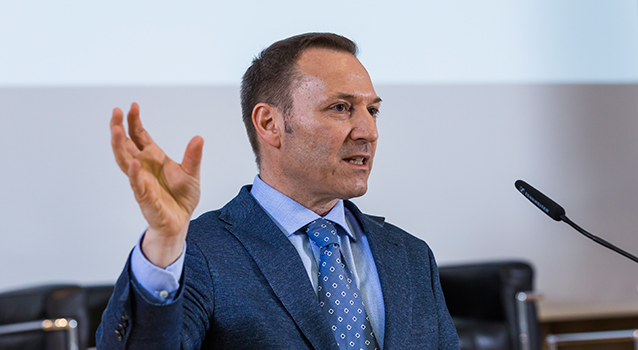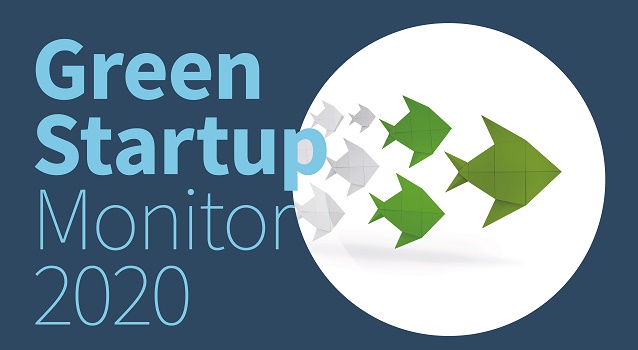ImpactNexus: Sustainability as a success factor
The Borderstep Institute for Innovation and Sustainability celebrates its 15th year of foundation with its first spin-off. Background
How can we leverage technology to assess the sustainability impact potential of new ventures? This is the guiding question that lead to the birth of ImpactNexus.
A spin-off of the Borderstep Institute and the Technische Universität Berlin and officially launched in 2021, ImpactNexus offers scalable SaaS solutions to assess, manage and report the impact & ESG performance of startups and their supporters. This helps startups and portfolio managers like investors, accelerators, incubators and startup support programs to:
☑️ avoid ESG risks,
☑️ maximize positive impacts and
☑️ build impact startups that are good for profits, people and planet.
The team behind ImpactNexus combines many years of academic research, practical industry and startup experience as well as latest tech expertise in software development and AI.
ImpactNexus’ assessment and measurement approaches build on latest academic research and international best practices like the Impact Management Project, @IRIS+ (by The Global Impact Investing Network) or the DIN SPEC 90051-1, a German ISO specification for the sustainability impact assessment of start-ups, co-developed by ImpactNexus.
For more information and contact, visit the ImpactNexus website.
Background
This year, the Borderstep Institute for Innovation and Sustainability turns 15. What are the economic opportunities in climate change? What factors determine the success and failure of sustainable innovations? How does the housing industry benefit from smart technologies? The independent and non-profit research institution seeks answers to questions like these.
Goal-oriented transformation policy
Thinking ahead about the future and providing profound sustainability knowledge for politics, business and society is an integral part of Borderstep’s mission. Thus, even when it was founded, the institute’s practice-oriented research projects focused on topics such as “digitalisation and sustainability”. Something that hardly featured in the public debate 15 years ago. What role do data centres play in energy consumption? How can digitalisation serve to achieve climate goals? What does the sustainable innovation landscape in Germany look like? Borderstep supports a sustainability-oriented transformation policy by continuously collecting data around the topics of energy, ICT, innovation and start-ups. The institute sees itself as a scientific pioneer of change.
Prof. Dr. Klaus Fichter, founder and director of the Borderstep Institute:
“Our focus is on the search for concepts that combine economic success with ecological and social sustainability, for example with climate protection or with the protection of natural resources. Borderstep provides knowledge bases and methods with which, for example, founders and investors can make sustainability an economic success factor.“
Increasing need to understand the sustainability contributions of start-ups
Prof. Dr. Klaus Fichter continues to act as an advisor to the EXIST-funded spin-off, which is currently going through the incubation process at the Centre for Entrepreneurship at the TU Berlin. Klaus Fichter notes an increasing need to reliably measure and assess the sustainability contributions of start-ups, the so-called “impacts”. However, assessing the sustainability contribution of start-ups is a challenging task, due to their limited historical track record, volatile business models and limited resources. The Borderstep spin-off addresses these challenges with digital solutions, in line with the institute’s long-standing focus on digitalisation and sustainability.
Digital solutions for assessing start-ups
Dr. Jannic Horne, Research Fellow of the Borderstep Institute, heads the start-up as CEO and brings his research expertise in impact measurement for start-ups to the company. The former management consultant sees many advantages in the close integration of ImpactNexus with the world of science.
Dr. Jannic Horne, CEO ImpactNexus:
“Science provides us with numerous insights into the social and ecological opportunities and risks of economic activity. Unfortunately, it is often not possible to make these findings usable for companies. Digital solutions offer a unique opportunity to make these insights more accessible to start-ups, investors and their partners.”
ImpactNexus offers scalable solutions for assessing, managing and reporting the social and environmental potential and risks of start-ups. This helps start-ups, investors, accelerators, incubators and funding programmes to avoid sustainability risks and maximise positive impacts for people and the environment.
The assessment and measurement approaches are based on the latest academic research and international best practices such as the Impact Management Project, IRIS+ or DIN SPEC 90051-1, a German ISO specification co-developed by Borderstep and the ImpactNexus team.
Customised support increases sustainability impact of start-ups
How can technologies be used to assess the sustainability potential of new companies? This shared interest brought the founding team together. Under the umbrella of the Borderstep Institute, the working group laid the bases for ImpactNexus. With an intensive customer discovery phase, the development of the first digital prototypes and the acquisition of funding.
By being accepted into the EXIST funding programme of the Federal Ministry for Economic Affairs and Energy (BMWi), ImpactNexus was able to launch as an independent company at the beginning of 2021. In constant exchange with customers, a first applicable product, a Minimal Viable Product, was created for the evaluation and assessment of the impact of start-ups. In the meantime, the product range has been expanded.
ImpactNexus also develops solutions to support investors in complying with the EU Sustainable Finance Disclosure Regulation. This has resulted in a process for assessing the ESG (Environmental, Social & Governance) performance of start-ups.
In addition, the team is working on AI-supported processes to make the topic of sustainability even more accessible in the future. For example, a knowledge database on the social and ecological impact of companies is currently being set up, from which benchmarks on CO2, supply chain risks and similar topics can be read out automatically.
Borderstep strengthens ImpactNexus team
To ensure that the spin-off’s growing staffing needs can be met soon, Borderstep is also supporting ImpactNexus in terms of personnel. Constanze Trautwein, a researcher at the Borderstep Institute until August 2021, now heads product development at ImpactNexus. In addition to her industry and start-up experience, she led the development of Europe’s first DIN SPEC for sustainability assessment of young companies.
Alexander Schabel, Senior Project Manager at Borderstep, will also join ImpactNexus operationally at the end of the year. He will take care of sales and marketing. The founder of his own start-up also has years of expertise in the start-up ecosystem (including the StartGreen platform and the organisation of the StartGreen Award of the Borderstep Institute) as well as practical experience as a start-up evaluator.
NGIN: Borderstep on grand challenges
In their newest web series, the international network NGIN is putting their members into the spotlight!
This video is looking at The Borderstep Institute of Innovation and Sustainability (Borderstep) with co-founder and CEO Dr. Severin Beucker. He explains how Borderstep is working to transform an entire region into a sustainable, climate-neutral data hub.
ISPIM 2021: Borderstep Impact Forum
The Borderstep Impact Forum 2021 is dedicated to the topic of sustainability assessment and impact measurement of start-ups.
The Borderstep Impact Forum 2021 will take place on June 21 & 22, 2021, as part of the annual conference of the International Society for Professional Innovation Management (ISPIM) in Berlin. It is dedicated to the topic of sustainability assessment and impact measurement of start-ups.
More information you will find at our event website.
Responsible Innovation Story with Borderstep
What is the current state of sustainability in Europe? Can the EU position itself internationally with it? And what do sustainable business models look like in concrete terms? “Responsible Innovation Story” explores these questions in a video interview.
Borderstep Director Prof. Dr. Klaus Fichter talks to host Prof. Dr. Andre Martinuzzi.
The most important findings of the interview:
- Sustainability innovation has gained a lot of momentum, especially in the vibrant start-up scene.
- However, funding programmes that support start-ups to scale up and leave their niche markets are still underrepresented.
- Only by building a robust sustainability-based innovation ecosystem can we create a future-proof unique selling proposition for Europe
Special Issue on Assessing and forecasting the sustainability impact of new ventures
The Journal of Cleaner Production is planning a special issue to evaluate and forecast the impact of new ventures on sustainability. Borderstep director Prof. Klaus Fichter is one of the guest editors.
Journal of Cleaner Production calls for submissions
Scientists are invited to submit their research for publication.
Paper submission procedure:
- Proposal submissions can be submitted until March 31, 2021, after which they can be elaborated in detail. The text length must not be less than 3000 words.
- A Paper Development Workshop on April 30, 2021 will support the researchers in the process. The participants will be selected by the guest editors. The event will take place online.
- The deadline for submission of full papers is July 1 to August 31, 2021.
More information on the schedule can you find here.
Guest editors of the special edition are:
- Klaus Fichter, Borderstep Institut und Carl von Ossietzky Universität Oldenburg, Deutschland
- Florian Lüdeke-Freund, ESCP Europe Business School, Deutschland
- Stefan Schaltegger, Leuphana Universität, Deutschland
- Simon Schillebeeckx, Management-Universität Singapur, Singapur
Start-ups implement environmental innovations
Entrepreneurs and start-ups are key players in the implementation of environmental innovations and new approaches to cleaner production. Therefore, the analysis of the impact of entrepreneurial ventures is of central importance for research in the field of cleaner production and entrepreneurship.
In order for entrepreneurship to promote sustainable development, it is crucial to understand how established firms and emerging young companies have a positive impact on sustainability.
Assessment of sustainability impacts of start-ups has hardly been researched so far
The sustainability impact of established companies and their products and services has been a key topic in business-related sustainability research for many years. This is true, for example, in the areas of social and sustainability accounting and reporting as well as entrepreneurship research.
However, the assessment of sustainability consequences of start-ups, for example by means of life cycle assessments or social impact analyses, is a neglected research area. This special issue of the Journal of Cleaner Production is intended to change that.
Green start-ups need more tailwind
Looking for tailwind and capital: An article on the Bertelsmann Stiftung’s innovation platform presents the results of the Green Startup Monitor 2020. Borderstep uses this instrument to analyze Germany’s green start-up scene in cooperation with the .
The team of authors examines how the ecosystem of sustainable start-ups has developed in recent years and which formats have a positive impact on the community. One example of this is the StartGreen Award, which Borderstep has been presenting since 2015 as part of the Startup Week Germany.
The fact that sustainability is not an explicitly “green” topic is demonstrated by the Sustainability4All project, which the article also introduces. Its goal is to anchor sustainability in the entire founding process – for future-proof business and stable business models. As the current crisis demonstrates, all companies are well advised to address this issue. And not just to serve “the environment”, but first and foremost themselves.
Investors now recognise the value of sustainable business models and manage their investments accordingly. Nevertheless, the capital question remains the biggest problem of green start-ups, the authors state.
You can read the full article here.
Green Startup Monitor 2020
The Green Startup Monitor 2020 celebrated its premiere on 29 April. The key findings of our Green Startup Monitor 2020 are now available in English!
The Green Startup Monitor analyses the importance of those start-ups that contribute with their products and services to the ecological goals of a green economy. The representative study is based on data collected through an online questionnaire from 1,620 innovative and growth-oriented companies that are less than 10 years old and have their headquarters in Germany.
Green startups are more confident about their future and want returns for all, people and planet! Green startups have a key function as an engine for structural change. Which hurdles do they struggle with? How can they best be supported?
The global economy is vulnerable. The current crisis shows that. The resilience of the economy must therefore be the focus of economic reconstruction. But how can we succeed in building a sustainable economy?
What are the biggest challenges for green start-ups?
Green start-ups can play a model role in this context. They have become an important part of the German start-up ecosystem. One in five German start-ups classifies itself in the green economy. What is the situation for these start-ups in Germany? What are the biggest challenges? And how are they mastering the crisis?
The Green Startup Monitor was published by the Borderstep Institute for Innovation and Sustainability in cooperation with the German Startup Association and was supported both technically and financially by the German Federal Environmental Foundation.
You can download the Green Startup Monitor 2020 free of charge here.
Digital energy management in existing buildings
The Smart Living industry association has submitted a statement on the Building Energy Act to Peter Altmaier, Federal Minister of Economic Affairs and Energy. In this statement, the association refers to the climate protection contribution of digitisation in buildings.
For this statement, Borderstep has calculated figures on the possible CO2 reduction through building automation systems in existing residential buildings in Germany.
“With an annual renovation rate of 300,000 apartments, around 2.3 million tons of CO2 can be avoided in 2030,” explains Dr. Severin Beucker, an expert on smart energy at Borderstep.
The building stock in Germany is responsible for a significant proportion of energy consumption and CO2 emissions. Digital energy management can help to significantly reduce this share and promotes the use of renewable energies. It is both economically and ecologically an important alternative for the refurbishment of existing buildings.
The use of smart building technology and intelligent control of energy use in buildings can thus make a substantial contribution to climate protection. This should be supported by targeted incentives for the use of intelligent systems and digital solutions in buildings, according to the statement.
The figures come from the Borderstep working paper “Reduction of CO2 emissions in existing buildings through digital energy management“. The publication (only in german) can be downloaded free of charge.
Digitisation = climate protection?
Cloud Computing, 3D-Printing, Big Data, Industry 4.0: The world of work and life is changing drastically due to digitisation. How does this affect climate protection? This is the topic of CliDiTrans, a new project of the Borderstep Institute.
Some studies are calculating the potential for reducing global CO2 emissions through ICT by up to 20 percent by 2030. These studies, however, do not take two essential aspects of increasing Digitisation into adequate consideration:
Firstly, digitisation triggers changes in demand. Completely new products and services are emerging or existing solutions are becoming better quality and cheaper at the same time, so that there is greater demand for them. Secondly, the use of ICT solutions is associated with national and international shifts in production processes.
Together with the ZEW – Leibniz Centre for European Economic Research and the practice partner Zweckverband Kommunale Datenverarbeitung Oldenburg (KDO), Borderstep analyses the climate protection effects of digitisation on the basis of case studies and macroeconomic considerations.
The project is funded by the Federal Ministry of Education and Research (BMBF) within the framework of the funding programme “Economics of Climate Change”.
Interview: Germany, Green Energy Valley
Clean Energy Wire interviewed Borderstep Director Prof. Dr. Klaus Fichter about the start-up scene in Germany. What role do engineers play in the “Green Energy Valley” to which Germany has developed? How can start-ups raise capital compared to Silicon Valley?
The interview introduces the reader to current research results of the Borderstep Institute, such as the Green Startup Monitor, which Borderstep has created in collaboration with the Startup Association of Germany.
The English-language portal Clean Energy Wire (CLEW) prepares the topic of energy transition in Germany for international media.
Read the full interview here.



